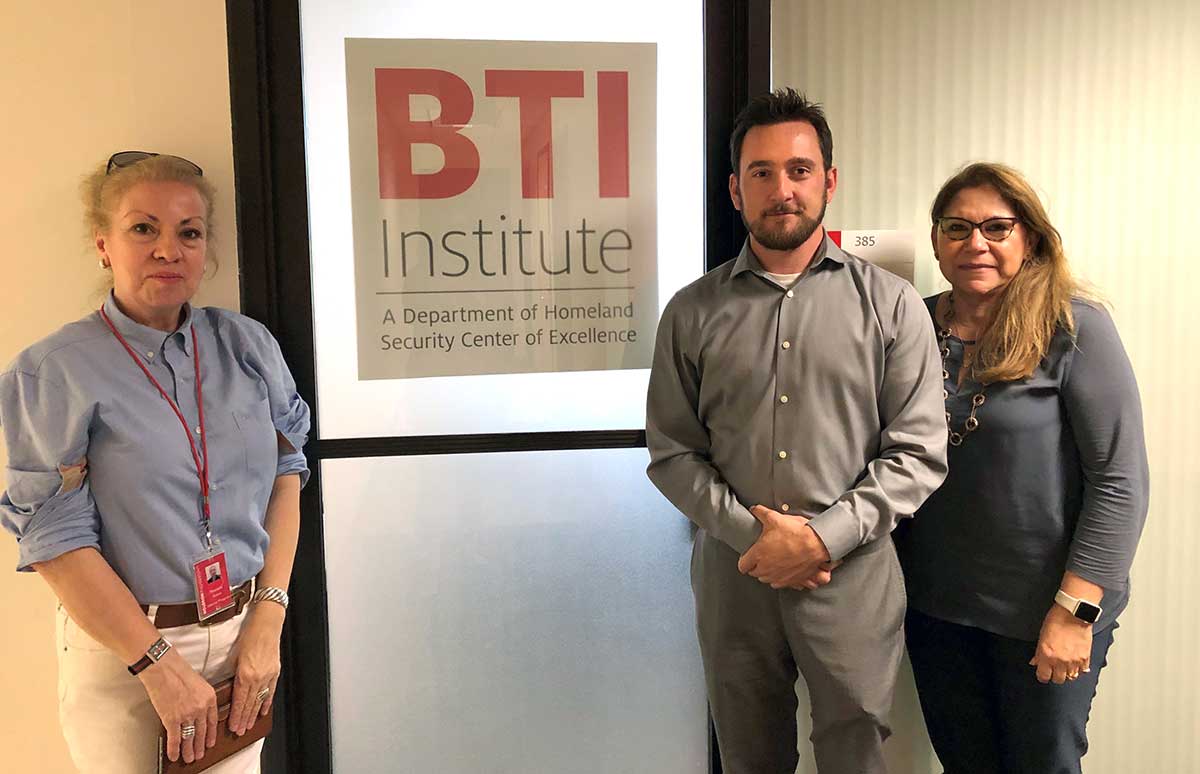Meet Nürşen Zanca, Ph.D., and Nicholas Randol
Faculty-student team investigates trends in Global Terrorism Index

Nürşen Zanca, Ph.D., left, and Nicholas Randol, center, studied the Global Terrorism Index at the Borders, Trade, and Immigration (BTI) Institute as part of the U.S. Department of Homeland Security Summer Research Program for Minority Serving Institutions. At right is BTI Institute staff member Maura Pereira De Leon, Ph.D. (Credit: Philip J. Boedeker/BTI Institute)
For researchers studying terrorist activity, the Global Terrorism Index (GTI) serves as a vital tool.
Developed annually by the Institute for Economics and Peace, the GTI ranks nations according to terrorist activity, taking into account the number of incidents, fatalities and injuries as well as the amount of property damage. The index is estimated from data collected by the National Consortium for the Study of Terrorism and Responses to Terrorism (START), an emeritus U.S. Department of Homeland Security (DHS) Center of Excellence (COE).
In summer 2019, Professor of Economics Nürşen Zanca, Ph.D., and student Nicholas Randol of the University of the Incarnate Word in San Antonio investigated the meaning and methodology of the GTI through the DHS Summer Research Team (SRT) Program for Minority Serving Institutions.
The SRT Program is designed to increase scientific leadership at Minority Serving Institutions in DHS research areas. The program provides faculty and student research teams with the opportunity to conduct research at university-based DHS Centers of Excellence.
Zanca and Randol were based at the Borders, Trade, and Immigration (BTI) Institute, a DHS Center of Excellence at the University of Houston. The BTI Institute conducts research to enhance the nation’s ability to secure borders, facilitate legitimate trade and travel, and ensure the integrity of the U.S. immigration system. Their research mentor at the BTI Institute was Luis R. Torres, Ph.D.
During their 10-week research appointment, Zanca and Randol explored trends in the GTI score for the U.S. and the economic cost of terrorism to the nation.
In a project summary, the team wrote: “Our preliminary results indicate a rise in the GTI score for the U.S., which is an indication of a rise in terrorist activity. In addition, the economic impact of terrorism includes both direct and indirect costs, such as psychological trauma, lost productivity, cost of medical treatments and property destruction. Since protecting the U.S. from terrorism is the founding mission of DHS, the preliminary findings indicate that terrorist threats remain.”
In the course of their research, Zanca and Randol also observed that domestic terrorism in the U.S. is a “persistent threat” and that there is a need for a comprehensive assessment of this trend.
In August 2019, at the conclusion of their appointment, the team presented their research findings during a poster session at the Centers of Excellence Summit at George Mason University’s Arlington, Virginia, campus.
Randol is grateful for his time in the SRT Program because it helped him hone his skills in research and writing. The Navy veteran now is pursuing a master’s degree in health administration at the University of the Incarnate Word. He aspires to one day work as a hospital administrator.
“I would recommend the SRT Program to anyone and everyone who can qualify and has the time to put into the program,” he said.
In early 2020, Zanca received additional funding from DHS to continue her research on the GTI and terrorism’s economic impact on the U.S. In this next phase, Zanca is investigating the idea of a Regional Terrorism Index for metropolitan areas. This new index would provide critical information for local, state and federal law enforcement to assess local threats, deploy resources efficiently and keep the public safe from potential terrorism.
“I truly consider myself a very lucky individual to be a part of the DHS MSI SRT Program,” Zanca said. “I am grateful for so many wonderful people and outstanding professionals who helped me through my research project.”
The DHS SRT Program is funded by DHS and administered through the U.S. Department of Energy’s (DOE) Oak Ridge Institute for Science and Education (ORISE). ORISE is managed for DOE by ORAU.
